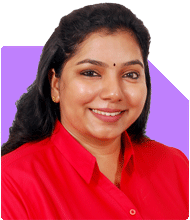Anil Rego |384 Answers |Ask -Follow
Financial Planner - Answered on Feb 03, 2023
He’s an expert in income tax and wealth management.
He has completed his CFA/MBA from the ICFAI Business School.... more

For 43 years old with ctc of 35 lacs what should be equity % savings / investment for long term ????
You may like to see similar questions and answers below
Advait Arora |1263 Answers |Ask -Follow
Financial Planner - Answered on May 24, 2023
Ramalingam Kalirajan |7838 Answers |Ask -Follow
Mutual Funds, Financial Planning Expert - Answered on Apr 05, 2023
Hardik Parikh |106 Answers |Ask -Follow
Tax, Mutual Fund Expert - Answered on Apr 11, 2023
Ramalingam Kalirajan |7838 Answers |Ask -Follow
Mutual Funds, Financial Planning Expert - Answered on May 08, 2024
Ravi Mittal |520 Answers |Ask -Follow
Dating, Relationships Expert - Answered on Feb 05, 2025
Ramalingam Kalirajan |7838 Answers |Ask -Follow
Mutual Funds, Financial Planning Expert - Answered on Feb 05, 2025
Pushpa R |49 Answers |Ask -Follow
Yoga, Mindfulness Expert - Answered on Feb 05, 2025
Pushpa R |49 Answers |Ask -Follow
Yoga, Mindfulness Expert - Answered on Feb 05, 2025
Dr Nagarajan Jsk |231 Answers |Ask -Follow
NEET, Medical, Pharmacy Careers - Answered on Feb 05, 2025
Milind Vadjikar |974 Answers |Ask -Follow
Insurance, Stocks, MF, PF Expert - Answered on Feb 05, 2025
Ramalingam Kalirajan |7838 Answers |Ask -Follow
Mutual Funds, Financial Planning Expert - Answered on Feb 05, 2025
Ramalingam Kalirajan |7838 Answers |Ask -Follow
Mutual Funds, Financial Planning Expert - Answered on Feb 05, 2025
Ramalingam Kalirajan |7838 Answers |Ask -Follow
Mutual Funds, Financial Planning Expert - Answered on Feb 05, 2025
Ramalingam Kalirajan |7838 Answers |Ask -Follow
Mutual Funds, Financial Planning Expert - Answered on Feb 05, 2025


























